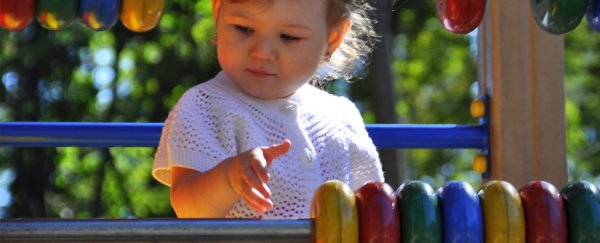The days of Sesame Street's resident counting vampire are numbered. It turns out toddlers a little older than a year already have a good sense of simple accounting - they can tell apart quantities of hidden blocks after hearing them being counted.
That doesn't mean they can do your taxes, but it does suggest that long before the little tots have the capacity to count to three, tiny brains can build expectations based on hearing a number sequence.
Johns Hopkins University psychologists Jenny Wang and Lisa Feigenson knew that while children aged around two-and-a-half years could often recite short lists of numbers, it wasn't until age four they started to appreciate what those words really meant.
"We buy counting books for babies and we count aloud with toddlers. All of that raises the question: Are kids really clueless about what counting means until they're in the preschool years?" says Feigenson.
We already know something is going on inside their heads. For example, experiments have found an 18-month-old will sense they're being duped if counting doesn't quite match up with an order of actions.
But the developmental timing of associating the whole counting action with some basic number sense has been a mystery.
To find out a little more, Wang and Feigenson ran five similar experiments with 16 infants participating in each one, aged between 13 and 20 months.
Of course, children this age aren't all that forthcoming about their numerical skills. So the psychologists made clever use of a common research tactic – they watched the kids' confused little faces.
Each of the five tests they conducted was based on a similar principle, where subjects observed the researchers put varying numbers of objects into a veiled box, and then watched them pull them out again.
Sometimes they'd pull out one object. Sometimes it was all of them. In each instance, they'd watch the infants' responses as they searched for any missing items.
Previous studies had shown if there were three objects or fewer, infants as young as 12 months would look in the box if they suspected the researcher was holding out on them. Use more than three objects though, and they seemed to lose track and not bother looking.
This suggested they weren't counting as such, but using their working memory to identify each item individually rather than assigning them with a numerical qualifier.
So to gauge exactly when they might start to associate numbers with a list of items, the researchers counted out the objects as they hid them.
The pair would also 'count' without numbers, such as by saying, "Look! This, this, this, and this … these dogs" to distinguish the counting procedure from other rhythmic noises.
The results strongly indicated that counting out the items made a significant difference to the infants' ability to recall how many objects to expect: If a researcher counted in five toys and pulled out three, kids as young as 14 months expressed confusion.
"When we counted the toys for the babies before we hid them, the babies were much better at remembering how many toys there were," says Wang.
"As a researcher these results were really surprising. And our results are the first to show that very young infants have a sense that when other people are counting it is tied to the rough dimension of quantity in the world."
What we take for granted as easy as 1, 2, 3, is actually a complex task that goes beyond a checklist of items. Computers might do well with algorithms that can carry out complex calculations, but they're little better than children themselves when it comes to 'knowing' what the number four looks like quantitatively.
Other animals, such as elephants, also have a basic but nonetheless impressive comprehension of what numbers mean.
"Research like ours shows that babies actually have a pretty sophisticated understanding of the world – they're already trying to make sense of what adults around them are saying, and that includes this domain of counting and numbers," says Feigenson.
This research is published in Developmental Science.
